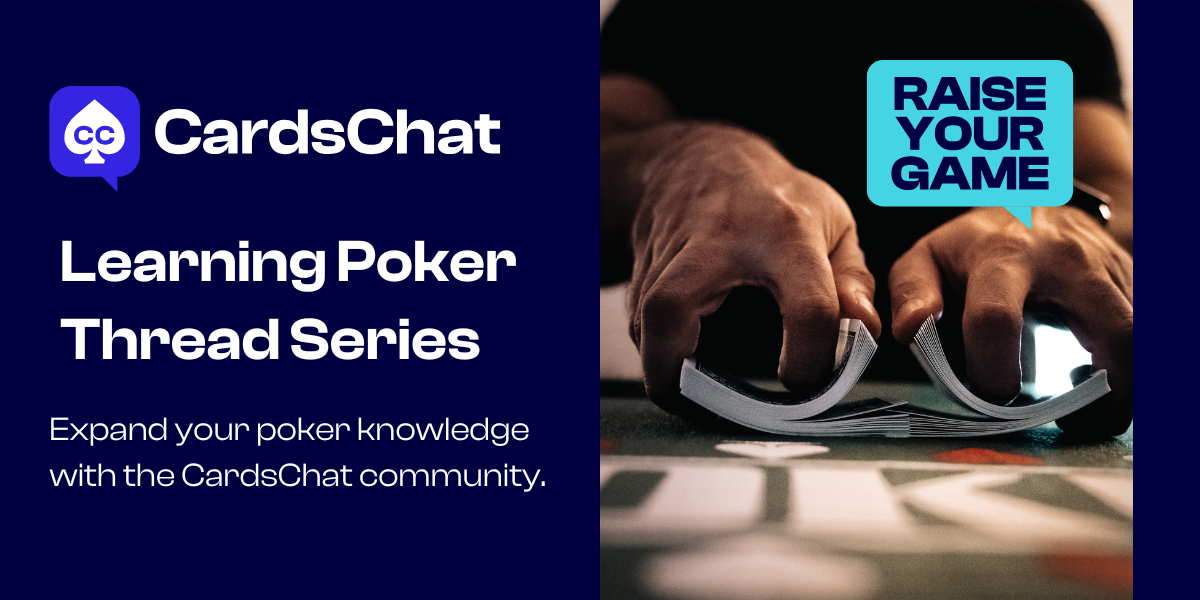CRStals
Moderator
Moderator
- Joined
- Jan 14, 2016
- Total posts
- 11,522
- Awards
- 19
- Poker Chips
- 1,733
- #1
🃏 CardsChat Learning Series | Part 5 of 5
Playing Post-Flop & Understanding the Differences in Heads-Up Tournaments vs. HU in SNGs or MTTs
To wrap up our CardsChat Heads-Up Poker series, we’re diving into post-flop play — what to look for as hands progress, how to adjust your strategy, and how to think through every street when facing just one opponent.We’ll also explore the subtle (but important) differences between playing in a Heads-Up (HU) tournament and reaching the heads-up stage of an MTT.
🔍 What We’ll Cover
- HU MTT vs. HU Tournament – What’s the difference?
- Post-Flop Play from the Button
- Post-Flop Play from the Big Blind
- Post-Flop Mistakes to Avoid
💥 HU MTT vs. HU Tournament — What’s the Difference?
While both involve one-on-one play, there are some key nuances between a dedicated HU tournament and reaching heads-up at the end of a multi-table event.1. Stack Sizes
- In HU tournaments, both players start with equal stacks, often around 100 BB.
- In MTTs, the heads-up stacks are rarely equal — one player usually has a lead.
- Always think of your stack as a percentage of the blinds, since that ratio determines your leverage as blinds increase.
- HU tournaments have shorter blind levels — you’ll need to profile your opponent quickly.
- In MTTs, blinds usually increase more slowly, giving you more time to gather reads and adapt.
- In an HU tournament, you start out not in the money — losing early means you’re out with nothing.
- In an MTT, reaching heads-up already locks in significant profit, so the mindset shifts.
- Expect tighter play early in HU tournaments, as players fight just to survive round one.
💥 Post-Flop Play from the Button
Being in position heads-up is a massive advantage. You control the pace, pot size, and overall rhythm of the hand.Tips for Playing Post-Flop from the Button:
- C-bet frequently — with any pair or draw, build pressure and fold equity.
- Read their range — the big blind defends wide, so if they keep calling on dry boards, tread carefully.
- Balance your range — mix in raises with both strong and weak hands to stay unpredictable.
- Adjust bet sizing — go bigger with deep stacks; tighten up when short.
- Track tendencies — if they call light, bet more for value and bluff less often.
- Leverage position — use your positional edge to apply relentless pressure and win small pots consistently.
💥 Post-Flop Play from the Big Blind
Playing out of position (OOP) in HU is tough — but smart adjustments can turn defense into offense.Tips for Playing Post-Flop from the Big Blind:
- Favor draw-heavy boards — low, connected, suited boards let you check-call or check-raise profitably.
- Check-raise strategically — even when draws miss, it can balance your range and slow the button’s aggression.
- Keep your story consistent — don’t bluff unless the line makes sense.
- Play solid defense — aim to win pots when boards miss the button or when you’ve got real strength.
- Pick your spots — catching over-aggressive opponents is key, but don’t force the issue every hand.
💥 Post-Flop Mistakes to Avoid
Common traps that can derail your HU game:- Being overly aggressive – especially from the button; know when to slow down.
- Playing too tight – you must defend almost everything in heads-up.
- Playing too loose – remember, high cards don’t always hold.
- Ignoring stack dynamics– always consider stack-to-blind ratios and fold equity.
- Equal stacks? Don’t overextend.
- One player short? Recognize how all-ins shift the math and momentum.
🎯 Summary
Heads-up poker is arguably the most skill-intensive format in the game.Even the world’s best don’t win every HU battle — the mix of aggression, psychology, and adaptability required is next-level.
But the more you practice, the more confident you’ll be when you reach those final tables. With the right mindset and plan, you’ll be ready to close out the win when it matters most.
💬 Your Turn — Heads-Up Poker Stories
What was your last tournament win, and how did you approach heads-up play?What adjustments or lessons helped you secure the victory — or what will you do differently next time?
Share your stories below to help others learn from your experience — and maybe pick up a new edge yourself! ♠️
🔔 Subscribe to the CardsChat Learning Series
Stay sharp and never miss a drop!Turn on notifications and keep building your edge — one position at a time.
You can find all our poker learning series right here: CardsChat Learning Poker Thread Series Guide

Last edited by a moderator:



















